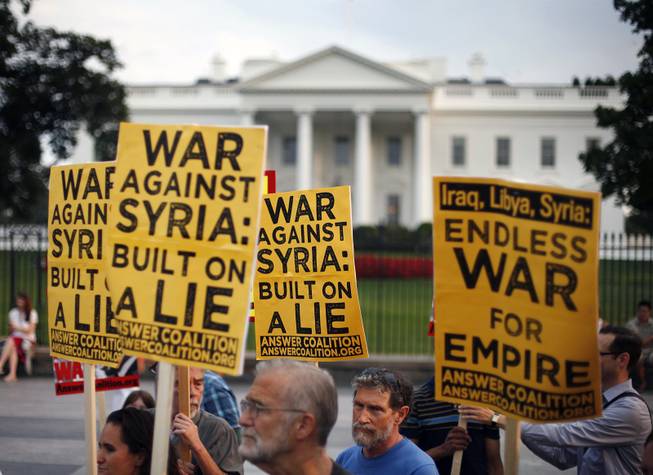
ASSOCIATED PRESS
Demonstrators take part in a protest calling for no military attack on Syria outside the White House in Washington, Thursday, Aug. 29, 2013.
Friday, Aug. 30, 2013 | 4:23 p.m.
The American public doesn’t have much appetite for a military strike in Syria.
People don’t fully understand how America has a national interest. They’re not well-versed on who’s fighting whom. And they wonder why this country is not spending precious federal dollars on boosting the domestic economy rather than engaging in faraway conflicts.
And, said Ipsos pollster Julia Clark, “they’re a little bit burned by mismanaged expectations” of American missions in Iraq and Afghanistan.
Support for military action would jump, according to polls, if it was proven the Syrian regime used chemical weapons on its own people. But even that boost wouldn’t fully erase the deep skepticism.
“No question people would have a highly negative reaction to the use of chemical weapons. But there is just limited support for involvement in the Middle East and in Syria,” said Carroll Doherty, an analyst at the Pew Research Center.
An NBC News poll conducted Wednesday and Thursday found half of Americans do not support military action in response to the Syrian regime’s use of chemical weapons. By 41 percent to 27 percent, they do not think the use of military force will improve the situation for Syrian civilians.
Members of Congress are hearing the same kinds of doubts, one reason they’re clamoring for President Barack Obama to lay out his case clearly before embarking on any military mission. The public agrees — nearly four in five want Obama to get congressional approval before acting.
In a rare display of bipartisan agreement, House Democratic leader Nancy Pelosi of California echoed the same concerns as those of Republican House Speaker John Boehner of Ohio.
“There needs to be more consultation with all members of Congress and additional transparency into the decision-making process and timing,” she said, “and that the case needs to be made to the American people.”
Even strong supporters of military action agreed.
“In this case the person who’s ultimately responsible is the president,” said Sen. Bob Corker, R-Tenn. “He has to explain to the American people what our national interests are; you know, why we would consider doing something like this. It cannot be a press release.”
Traditionally, Americans rally around a president as he orders military action. But if the underlying backing was not there previously, that support evaporates quickly if the mission goes awry. Bush got support in the wake of the Sept. 11, 2001, terrorist attacks, arguing that military action was an important way of preventing more such attacks.
Today, the American self-interest is less clear.
“Our troops aren’t being attacked. Our nation isn’t being attacked,” said Rep. Peter DeFazio, D-Ore.
Ipsos’ Clark added that many people are confused by the Syrian situation: “It seems murky to them.”
The mission becomes clearer if evidence is strong that chemical weapons were used; in that case, the U.S. can make an important statement.
“We should be making it clear that chemical and biological weapons are off limits,” said Rep. Chris Van Hollen, D-Md. “There are international norms, and if we don’t enforce those norms it will come back to haunt us.”
Even then, military action would proceed on fragile political pillars.
Foremost among public concerns is war weariness. An Aug. 19-23 Ipsos-Reuters poll found 60 percent said the United States should not intervene in the Syrian conflict. Secretary of State John Kerry on Friday acknowledged the wariness.
“We know that after a decade of conflict, the American people are tired of war,” he said in remarks about Syria. “Believe me, I am, too. But fatigue does not absolve us of our responsibility.”
The public reluctance at the start of a mission is somewhat unusual. The Iraq war began with strong bipartisan support in 2003. Pew found nearly three in four people in April 2003 thought using military force in Iraq was the right decision. But as the basis for the war turned out to be faulty and the conflict dragged on, opinion turned sharply. Five years later, 37 percent thought the U.S. had done the right thing.
“I don’t think there’s any question Afghanistan and Iraq affect opinion,” said Corker.
A Pew survey in June found that two-thirds thought the U.S. military was “already too overcommitted.”
There’s also uneasiness about the expense of a military conflict. Automatic spending cuts slashed federal budgets this spring, and more cuts are due to take effect in October — cuts that will hit the Pentagon particularly hard.
“Our military has no money left,” said Sen. James Inhofe of Oklahoma, the top Republican on the Senate Armed Services Committee. “Will the president pay for this operation with more furloughs and by grounding squadrons again? By continuing to raid the already underfunded base defense budget, Administration Obama further undermines future military readiness and capabilities.”
To pollster Clark, the message is clear.
“There’s a lot of confusion, and this is something people don’t know a great deal about,” she said. “To many, it seems like another Middle East quagmire.”

Join the Discussion:
Check this out for a full explanation of our conversion to the LiveFyre commenting system and instructions on how to sign up for an account.
Full comments policy